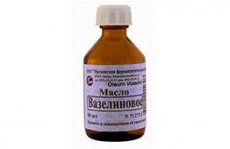Medical expert of the article
New publications
Preparations
Vaseline oil
Last reviewed: 03.07.2025

All iLive content is medically reviewed or fact checked to ensure as much factual accuracy as possible.
We have strict sourcing guidelines and only link to reputable media sites, academic research institutions and, whenever possible, medically peer reviewed studies. Note that the numbers in parentheses ([1], [2], etc.) are clickable links to these studies.
If you feel that any of our content is inaccurate, out-of-date, or otherwise questionable, please select it and press Ctrl + Enter.

Vaseline oil is a synthetically produced substance, a product of the processing of residual petroleum fractions, obtained by distilling diesel oil after kerosene distillation.
Indications petroleum jelly
Vaseline oil can be used:
- for internal use (for chronic and frequent constipation, intoxication with fat-soluble toxic substances - gasoline products, benzene, kerosene, etc.);
- for external use (to soften the skin, to prepare ointments and creams);
- for lubrication of catheters and enema tips.
Release form
Vaseline oil for medical use is produced in the following dosage forms:
- ampoules of 2 ml;
- 25 ml or 50 ml bottles;
- bottles of 90 g, 130 g, 180 g or 200 g.
 [ 1 ]
[ 1 ]
Pharmacodynamics
When taken orally, the drug has an effective laxative effect. This occurs due to the lubrication of the intestinal walls, softening of dense fecal stones during constipation. Vaseline oil can also have a slight potentiating effect on peristalsis.
The drug is also called "liquid paraffin" - this hydrocarbon mixture does not dissolve in ethanol and water, but is perfectly soluble in combination with chloroform or ether. Vaseline oil can be mixed with all types of vegetable oils, except castor oil.
Dosing and administration
Internal use of Vaseline oil (for the treatment of constipation) can be taken on an empty stomach up to 2 tablespoons 1-2 times a day. The laxative effect is usually expected 5 hours after use. The duration of continuous treatment is no more than five days.
In childhood, the drug is used only externally, lubricating flaky and irritated skin surfaces.
Use petroleum jelly during pregnancy
During pregnancy, the use of vaseline oil for internal use is not recommended: it may stimulate uterine contractions, which may lead to miscarriage. External use of the drug is acceptable.
It is better to consult with your doctor about the internal use of vaseline oil during lactation.
Contraindications
Side effects petroleum jelly
Frequent and prolonged internal use of the drug may cause some addiction and sluggishness of the intestines, as well as digestive disorders.
The oil does not allow fat-soluble vitamins to be absorbed, which can subsequently cause vitamin deficiency.
When used externally, an insufficiently purified petroleum product may have an irritating effect on the skin.
 [ 11 ]
[ 11 ]
Overdose
When taking too large doses of the drug at the same time, dyspeptic disorders may develop in the form of diarrhea, digestive disorders, and vomiting. Treatment of this condition is symptomatic.
 [ 14 ]
[ 14 ]
Shelf life
Attention!
To simplify the perception of information, this instruction for use of the drug "Vaseline oil" translated and presented in a special form on the basis of the official instructions for medical use of the drug. Before use read the annotation that came directly to medicines.
Description provided for informational purposes and is not a guide to self-healing. The need for this drug, the purpose of the treatment regimen, methods and dose of the drug is determined solely by the attending physician. Self-medication is dangerous for your health.

